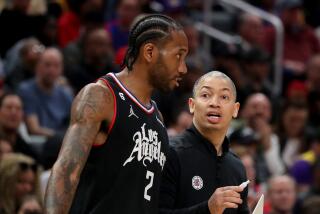Night and Day
- Share via
One is young and intrepid, the other a temperate veteran.
One is a promising rookie, the other a longtime fixture in professional cycling.
Together, David Clinger and Thurlow Rogers represent the new order and the established force on the Mercury road team that is pedaling away with the National Cup Series title.
With about two-thirds of the season completed, Mercury has 1,446 points and leads second-place Saturn by nearly 400 points in the 19-team field.
The season includes a stop in Manhattan Beach on July 26 before concluding in Burlington, N.C., on Sept. 12. Mercury is looking for its third consecutive championship.
Clinger, 20, and Rogers, 38, are on opposite ends of the age and experience spectrum on the team, but both are integral components.
“They feed off each other,” said John Wordin, director of the 10-man team the past seven years, the past three on the pro circuit. “Dave is just starting to figure out how good he’s going to be.”
If he can stay in one piece.
Clinger, a Woodland Hills resident and former Taft High cross-country runner, returned to racing a few weeks ago after breaking a leg in April.
“I was messing around with my dirt bike one afternoon and dumped it on a downhill,” Clinger said. “I haven’t touched [the bike] since . . John would flip if I rode it.
“It was a big wake-up call. I had a month [while mending] to think about it.”
Wordin, 35, who lives in West Hills and is a former football assistant at Granada Hills High, doesn’t believe Clinger will take the same risk again.
“It took Dave a while to mature,” Wordin said.
For Rogers, the team’s captain, that process took place long ago. The Van Nuys resident, a member of the U.S. Olympic team in 1984, provides a stabilizing influence on the Mercury squad.
“I like seeing the new guys come up and I like helping them do well,” Rogers said. “I’ve seen a lot of hairstyles come and go.”
Despite racing against guys much younger, Rogers is no pushover. He ranks 16th in the individual standings with 146 points, fourth best on the team. But Rogers said his brain is more valuable to the team than his legs.
“There’s psychology involved in every race. It’s like a chess game,” Rogers said. “I can analyze [teammate] moves during races, and tell them whether they were good or doomed from the start.
“For me, that’s what keeps it fresh and interesting. If you use the right tactics, everyone has a chance, not just the better riders.”
Clinger is not among the individual leaders because a layoff caused by his broken leg, but he continues to improve and refine his skills. He placed second in the sixth and final stage of the Tour de Beauce in Quebec, Canada, on June 21 and was selected the top under-23 rider in the race.
Clinger and teammates Julian Dean and Mark Walters were chosen Thursday to compete in September in the Tour de Avenir in France, which Wordin called the Tour de France for under-25 riders. Dean, from New Zealand, is second in the NRC individual rankings with 479 points.
Clinger said he has learned racing tactics from Rogers and Wordin since he took up cycling at 12. The three often would ride together in the Valley and Wordin kept an eye on Clinger, waiting for the chance to put him on the team.
“He got to the point where he developed and we had a spot for him,” Wordin said.
The team, although capable of holding its own in European races, is better-suited for American competitions with sprinters Dean and Gord Fraser, a member of the 1996 Canadian Olympic team. The U.S. events usually are 50-mile criteriums and road stages of 75 to 100 miles.
“This team is bigger and better than the ones I’ve been on the last four years,” Rogers said.
Although seemingly grueling, the seven-month, 40-plus-event season offers enough breaks for the riders to regain their strength. And the climate so far has been accommodating.
“The more you compete within reason, the better you get,” Rogers said. “We get to go home during the season and get revitalized, otherwise you’d get burned [out].
“It’s weird, we’ve mentioned to each other that we haven’t done a race when it was super hot. In Canada, we had rain on and off.”
Rogers is willing to put up with the elements for a while longer.
“Travel, race and make a living at it,” Rogers said. “It’s pretty nice.”
Another lesson for Rogers and Wordin to pass on to Clinger and the rest of cycling’s new generation.
More to Read
Go beyond the scoreboard
Get the latest on L.A.'s teams in the daily Sports Report newsletter.
You may occasionally receive promotional content from the Los Angeles Times.






